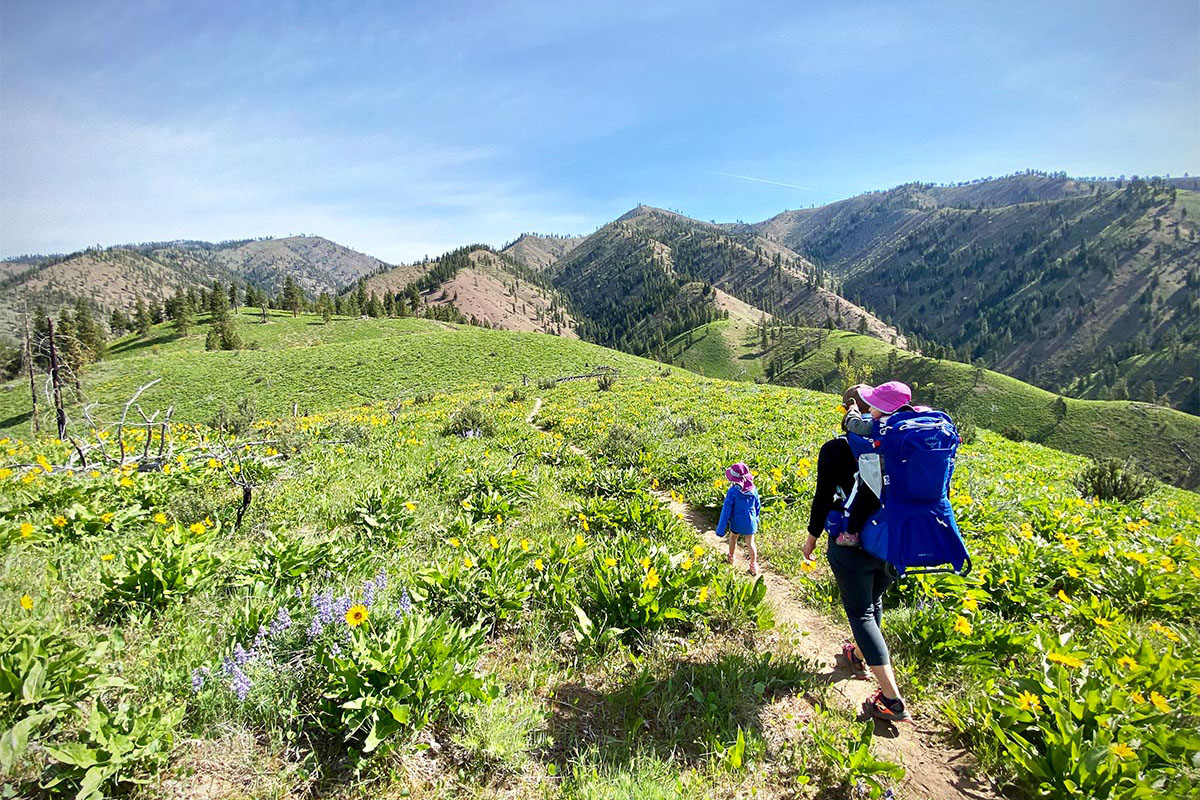
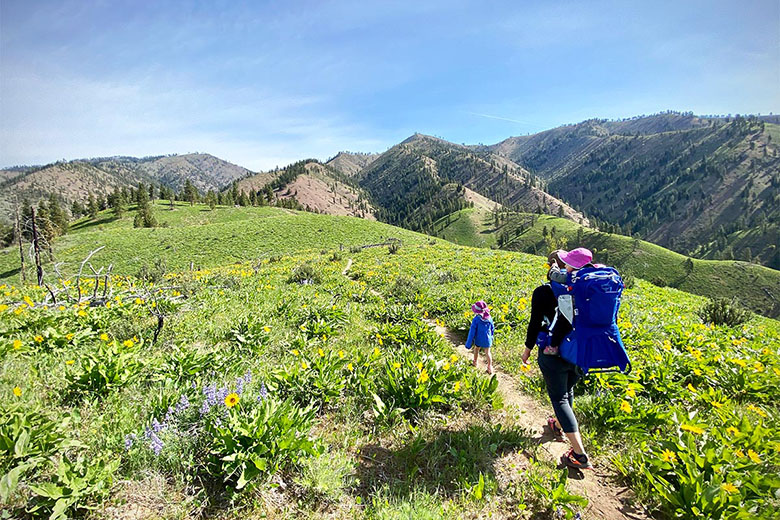
Switchback Travel


Switchback Travel
Price: $320
Weight: 7 lbs. 14 oz.
Capacity: 26L
What we like: High-quality build, easy-to-use child harness, and excellent storage.
What we don’t: Not a standout in carrying comfort and pricey.
See the Osprey Poco Plus
Osprey’s Poco (offered in both standard and “Plus” models) is easily one of the most popular and recognizable child carrier packs on the market, and it underwent a fairly thorough revamp last year. My wife and I gave the fully featured Poco Plus a season-long test and found it to be noticeably better-cushioned than the prior generation. However, while it’s still a class leader in terms of organization and ease of use, it comes up a little short of its primary competitor, the Deuter Kid Comfort, in all-around carrying comfort. Below are our experiences with the Poco Plus. To see how it stacks up, see our article on the best baby carriers for hiking.
As an owner of the prior-generation Poco, I was really happy to see the changes that Osprey made with their latest Poco Plus. The most notable upgrade was adding padding around the hipbelt. The old model relied on too much mesh, and its firm structure had a tendency to dig into your hips, but this is no longer a problem: the cushioning on both the shoulder straps and hipbelt is fantastic, hitting a nice balance of softness and support, and has led to zero complaints from either my wife or myself. In addition, the suspended mesh along the backpanel does a nice job hugging your back, and it’s very easy to dial in the torso and hipbelt fits for those that share carrying duties (more on this in “Fit and Sizing” below). Finally, the full aluminum frame is sturdy and felt plenty strong whenever I’ve pushed the 48.5-pound limit (importantly, this number includes the pack’s weight, which is just under 8 lbs.).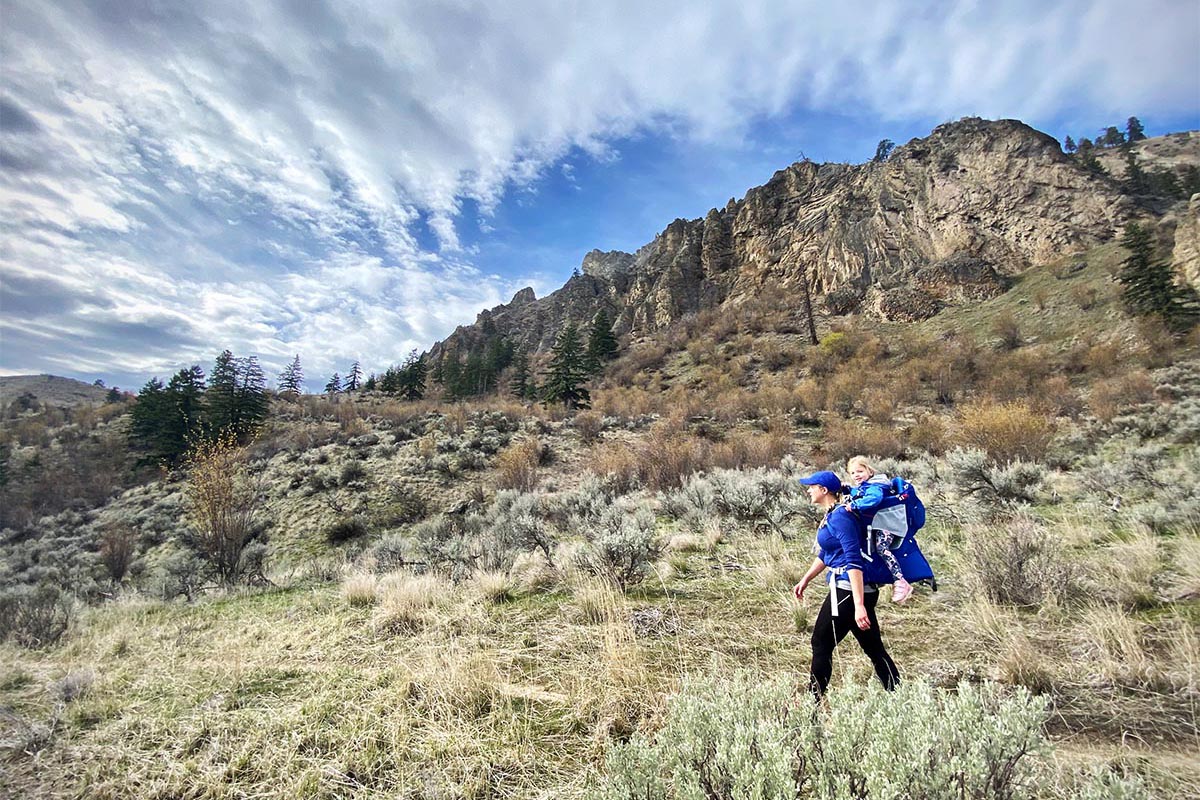
That said, the Poco Plus can’t match the aptly named Deuter Kid Comfort in all-around carrying comfort. One culprit is the Osprey’s large and pronounced grab handle located right behind the head, which is fairly rigid and sits close enough that it hits both of our necks when we look up trail (it’s particularly annoying on steeper inclines). We’ve tried adjusting the torso length slightly, but it’s remained a consistent complaint throughout testing. It’s worth noting that you can tuck the handle away underneath the drool pad to minimize the problem, but you’ll need to remember to redeploy it each time you remove the pack. All told, the grab handle isn’t a dealbreaker, but we certainly wish they would’ve done a better job with its placement.
We’ve also found that the Osprey doesn’t carry the load as close to your back as we’d like. Part of this due to the excellent organization and storage, but the child seat is set farther back than on alternatives like the Deuter, and you need to leave the kickstand extended to utilize that storage space. Added up, the pack feels large and unwieldly, almost like it’s pulling you backwards. To be fair, the design is a significant jump forward from prior generations and still is decently comfortable, but it doesn’t match its primary competitor in this respect.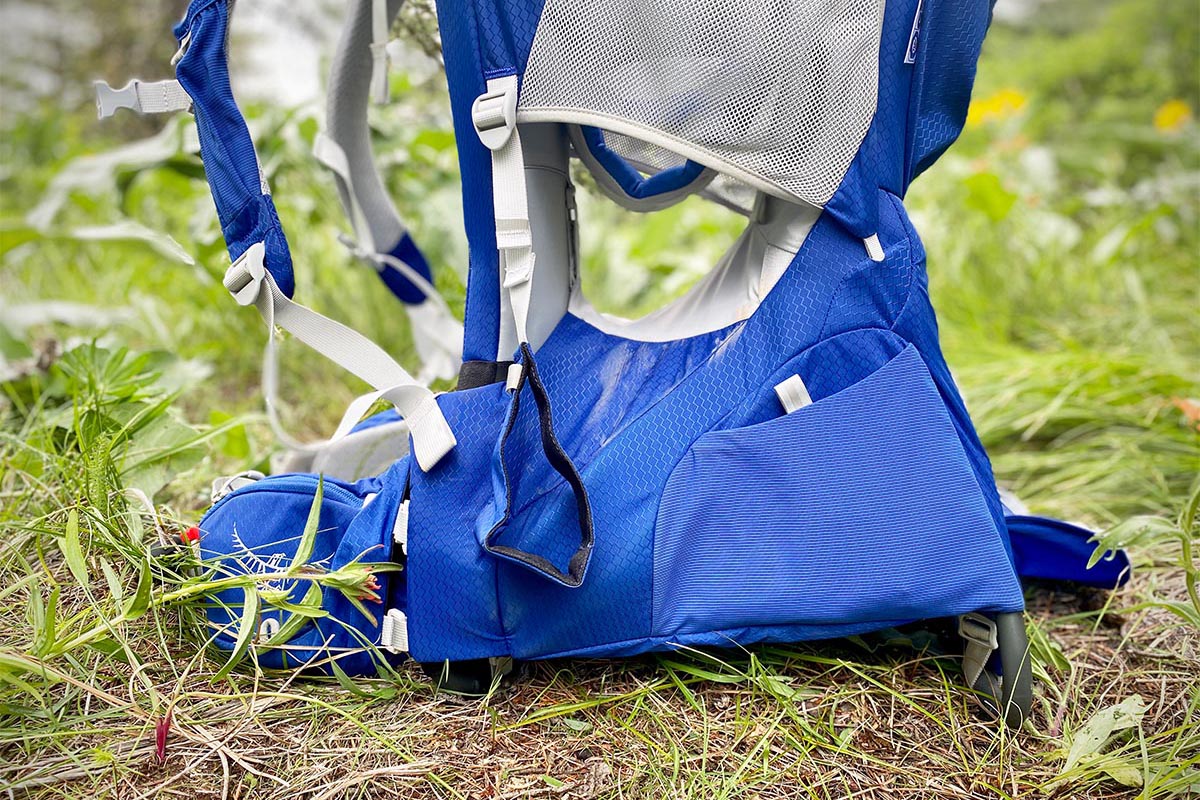
The child cockpit and harness layout is one area where the Poco Plus truly excels. Starting with the harness, Osprey reworked the design for the latest model, and the two arm loops now secure behind the child (the prior generation and most other baby carrier packs buckle in front). The straps themselves also have a fair amount of stretch, and we’ve found them extremely easy to secure, even with an active 2-year-old. Some competitors, including Deuter’s Kid Comfort, require four buckles and some reaching into the top or sides of the cockpit to strap in, but the Osprey’s design is fast and simple. And importantly, we’ve also found it easy to adjust the height for those with multiple kids. We also have a 4-year-old that gets the occasional ride, and lowering the seat is as easy as lifting the well-marked red handle near the top of the pack and pushing down on the seat. Raising is even easier: just grab the handle on the seat and slide it up.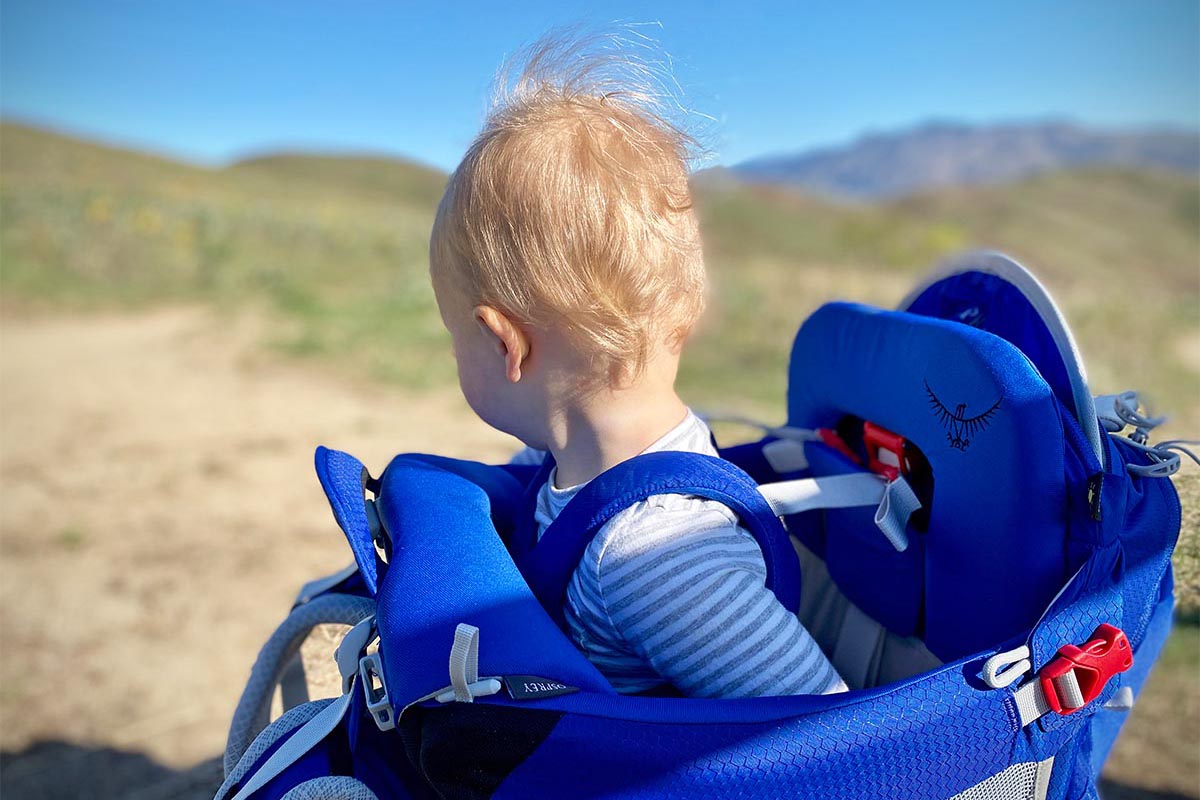
For the cockpit itself, cushioning along the interior is also quite good, including padding along the back, sides, and a fairly generous front drool pad. The front pad secures with Velcro and is a slight pain to remove for washing (it’s machine-washable, which is very convenient), but it’s certainly functional and reinstalls fairly quickly with practice. Rounding out the features, the included stirrups are a handy inclusion for longer days—our kids were uninterested in them until they were around 20 months, but then they became something they enjoyed—and there’s ample mesh along the sides for staying cool (more on this below).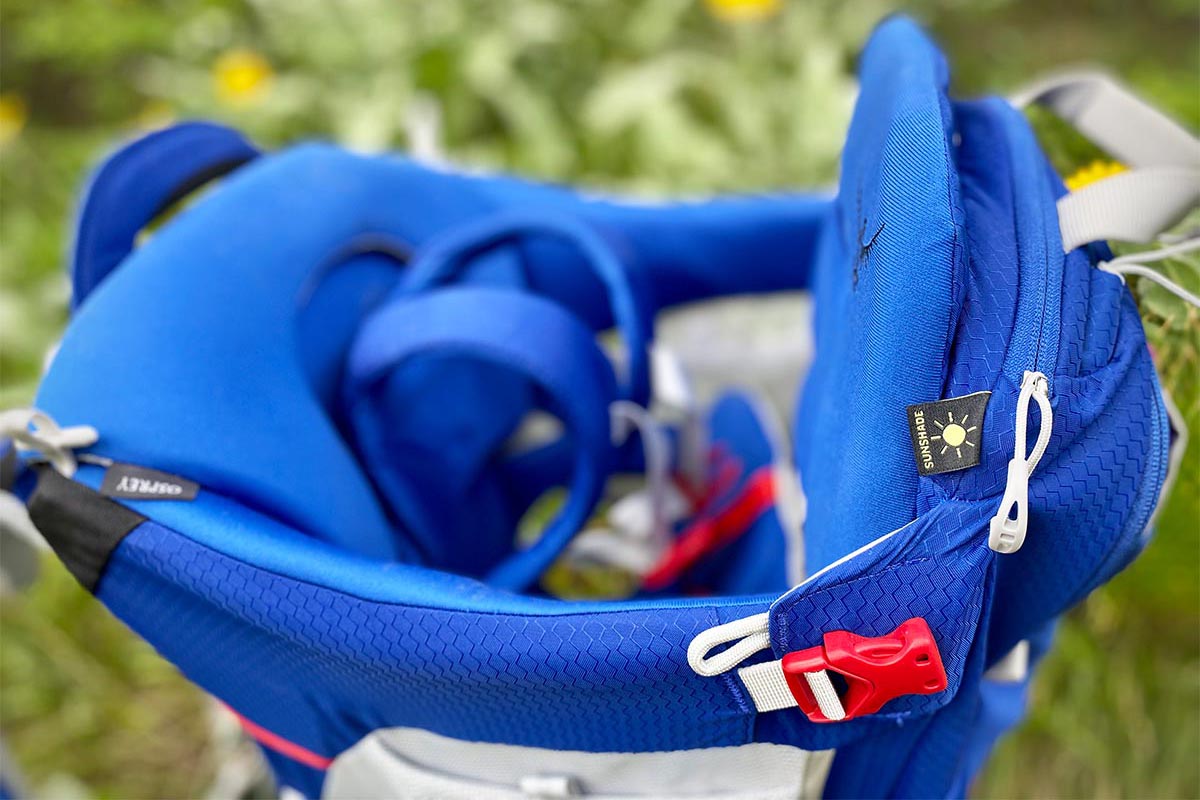
Our main nitpick with the cockpit design is the relatively small opening for sliding your child’s feet through. This requires a fair amount of precision when positioning their feet—an active and kicking child usually winds up placing at least one foot on the seat rather than finding the hole—and removing your child often results in a shoe getting pulled off and dropped to the ground. And for larger toddlers and kids, we’ve found the side access on the Deuter Kid Comfort to be a valuable addition and one that we miss on the Osprey. That said, this is a fairly minor complaint, and adding the secondary entry would likely result in a more complicated harness design.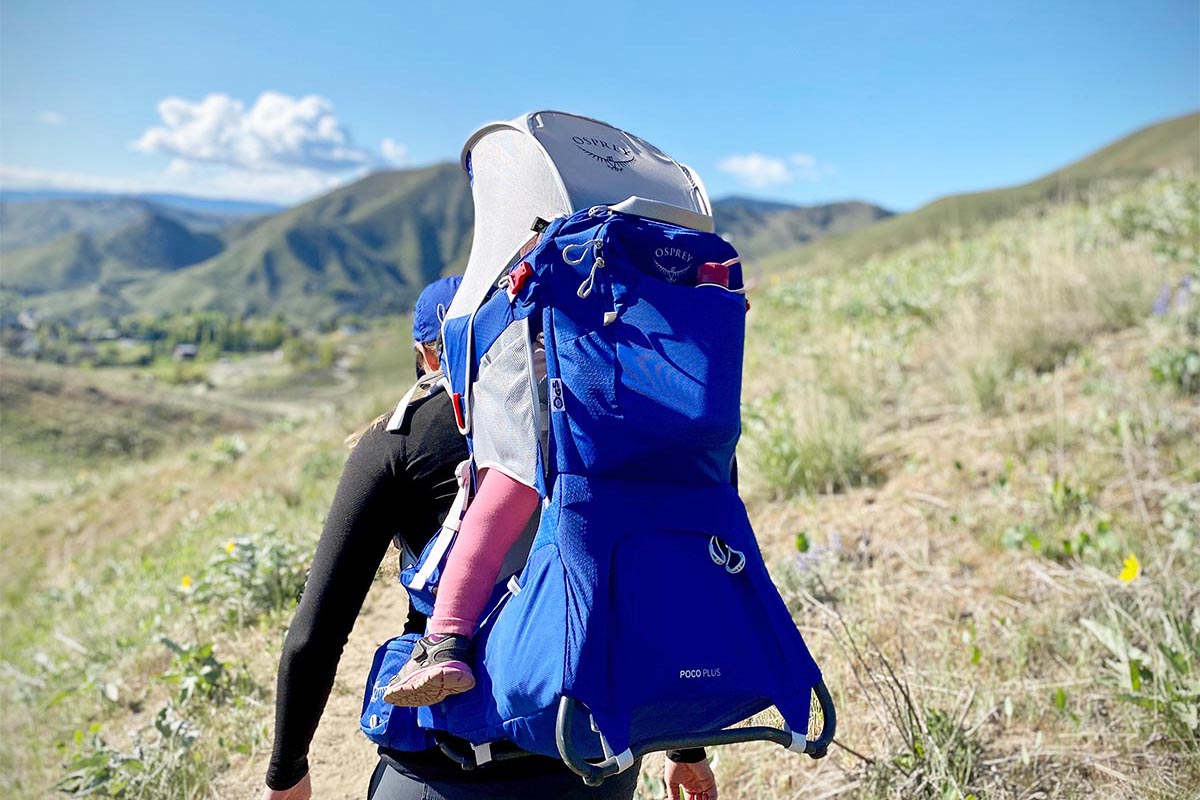
The Poco Plus is a premium pack that comes with all the bells and whistles you would expect at this price point. Along the top of the front, there are two zippered pockets: a small one that’s sized right for a wallet or phone and includes a key clip, and a much deeper pocket (it measures roughly 13 inches in height) for storing larger items. There’s also a mesh shove-it pocket for things you want close at hand (we often use it for kids’ water bottles and/or sun hats). But the real standout is the bottom pocket, which is downright cavernous. It zips open in a half-moon shape and is nicely sized for swallowing bulky items like jackets, a bag for lunches, and a larger water bottle. All told, the bag proven to be just about perfect for our family of four on full days (we’ve rarely maxed out the 26-liter capacity), and its size makes it suitable even for overnight adventures, provided another person can haul larger items like tents and sleeping bags.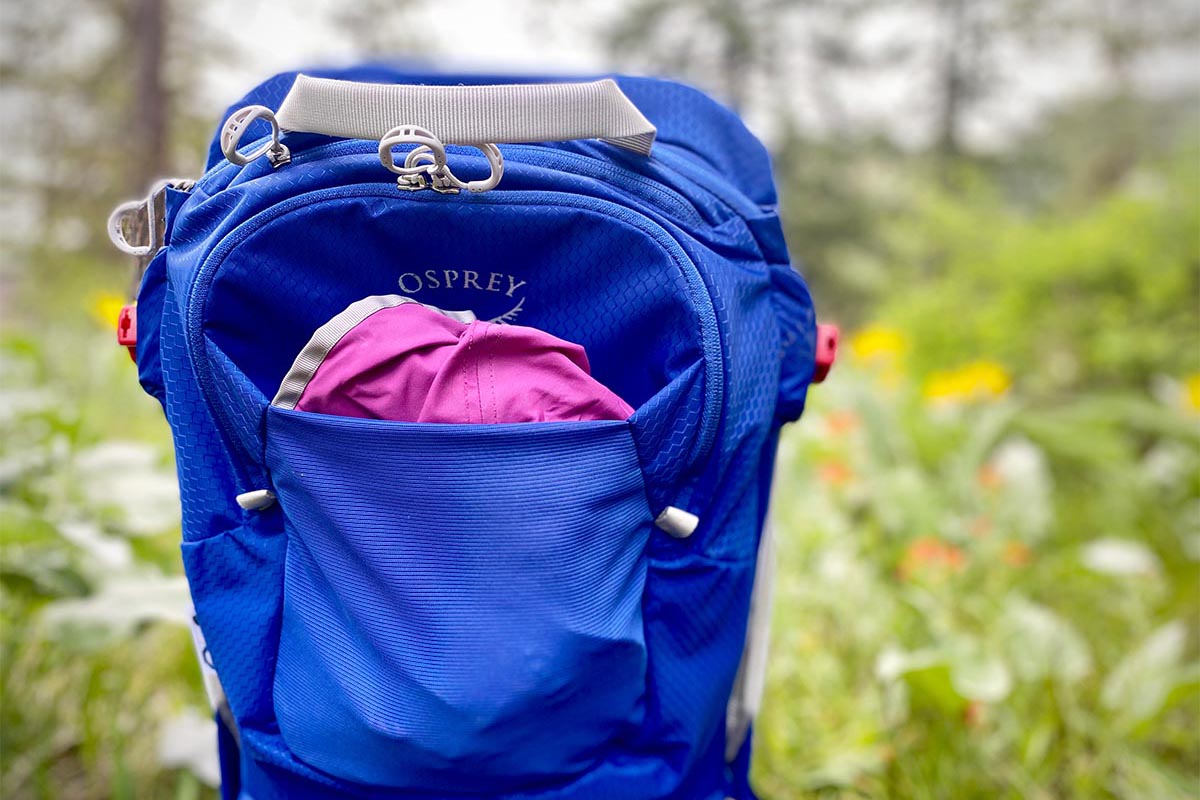
Rounding out the storage, there are stretch mesh pockets along the sides of the harness as well as at the bottom. That said, we don’t utilize these often because they’re too small to reliably hold water bottles, and we prefer the security of a zippered design (although some might find them useful for divvying up smaller items). And dual zippered hipbelt pockets are an invaluable addition for stowing wrappers, small snacks, and a phone (although they’re a little small for a large model like the plus-sized iPhone 11). Finally, there’s a dedicated space immediately behind the mesh backpanel for a hydration reservoir (the max it can fit is a 1.5L bladder). It’s not an ideal set-up—it hangs somewhat awkwardly and can press against your back if the reservoir is full—but it’s still a nice option to have and secures with an included loop and buckle.
Osprey is a market leader in well-ventilated packs, and the Poco Plus is no exception. The backpanel technically has a little less mesh than the outgoing model, but it still covers the majority of the back, and there’s sufficient space between the panel and the body of the pack for air to flow. In addition, there are cutouts in the foam on the shoulder straps, and a lightweight mesh-like fabric covers both the hipbelt and shoulder strap padding. Finally, there’s ample space between you and your child behind you that you don’t need to worry about getting overly hot (a very notable downside of frameless baby carriers). And the child’s cockpit sticks to a similar script: there’s mesh along both sides, which allows for air to flow freely, and even the sunshade has mesh covering the sides to help keep your kiddo cool. In fact, we’ve had no issues with overheating even when temperatures have creeped into the low 80s Fahrenheit.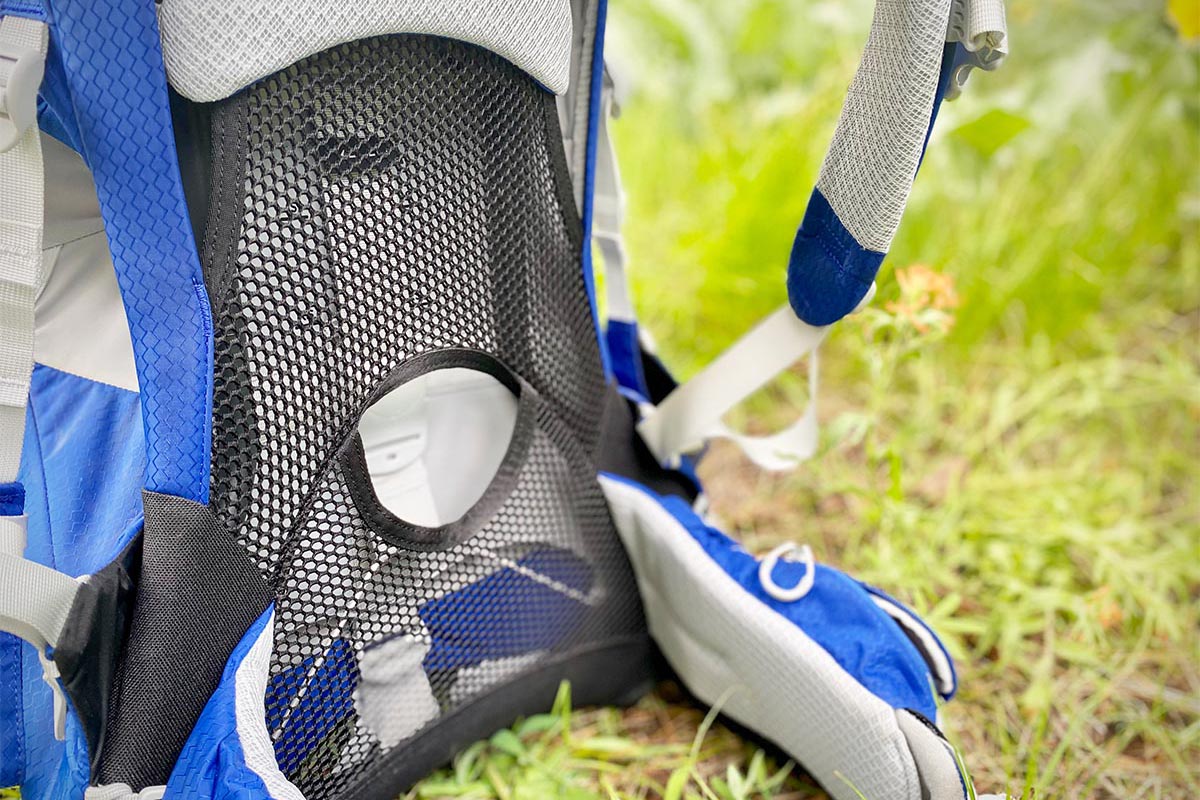
One of the most valuable features of a premium baby carrier pack is its sunshade—we find ourselves using it on nearly every hike we take—and Osprey includes a good one on the Poco Plus. The large shade (which boasts UPF 50+ UV protection) stores in a dedicated zippered pocket right along the top of the pack, and it’s quick and easy to deploy: simply unzip the pocket and lift it straight up and out. The sunshade then secures along the side (it’s easy to locate thanks to the red striping). That said, it does take a little effort to pull the sunshade to lock it in place, and we’ve found it’s easier to deploy when setting the pack down (rather than having your hiking partner adjust it while you’re carrying the pack).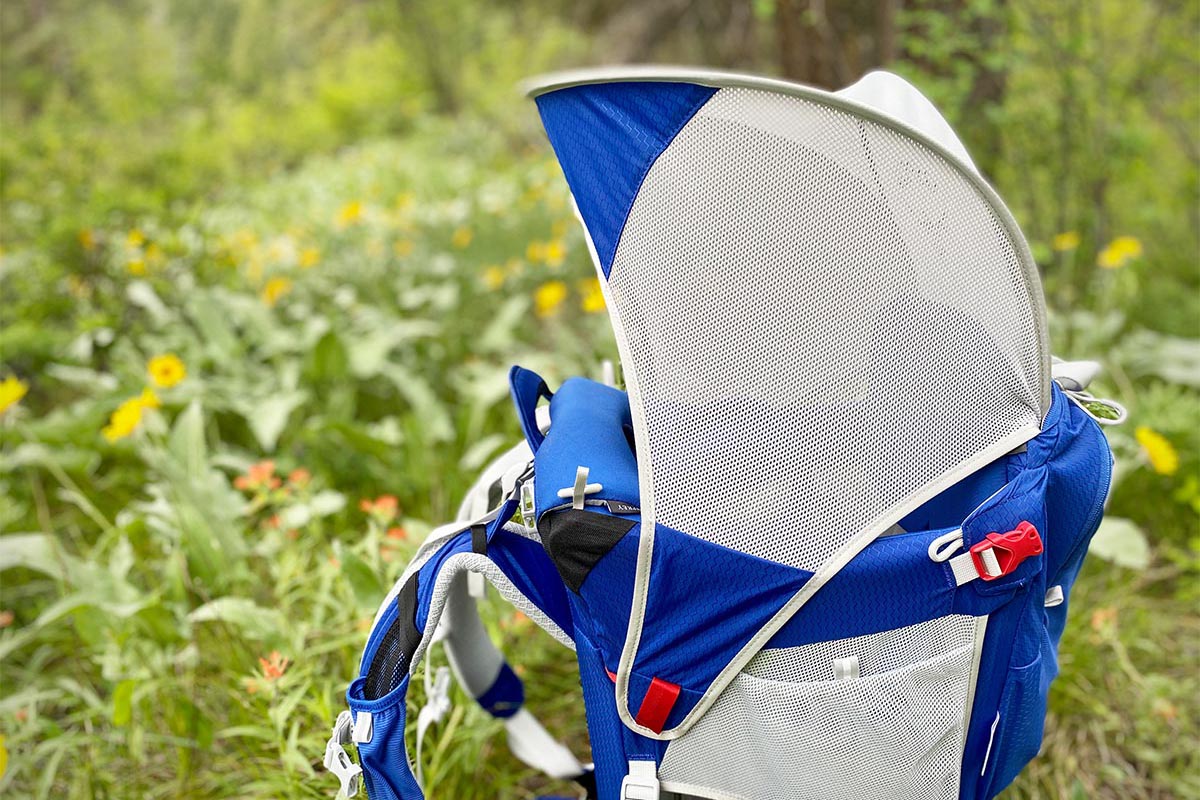
In terms of all-around coverage, the Poco Plus’ sunshade is a real standout. As I mentioned above, there’s mesh along the sides that does a nice job taking the sting out of direct sunlight and wind, and the back and a portion of the front include a solid fabric that shields nicely. Taller children might have a little trouble seeing out of the pack as the shade does hang fairly low in the front, but the tradeoff in protection is worth it.
Premium kid carrier packs are never feathery light, and the Poco Plus is no exception. Weighing in at 7 pounds 14 ounces, it’s hefty even before you add a child, but the weight is close to average on the market. For reference, it stacks up well against similar models including the Deuter Kid Comfort Pro (7 lbs. 13.2 oz), Thule Sapling Elite (7 lbs. 15 oz.), and Osprey’s own standard Poco (7 lbs. 11.2 oz.). Deuter’s Kid Comfort (no “Pro”) comes in lighter at 7 pounds 2 ounces, although the Poco Plus has more storage options. And Kelty’s Journey PerfectFIT Elite (7 lbs. 4 oz.) also undercuts the Poco Plus, but that pack falls short in both ventilation and carrying comfort. Overall, given the high-quality build and sheer number of features, we think the Osprey’s weight is well-spent.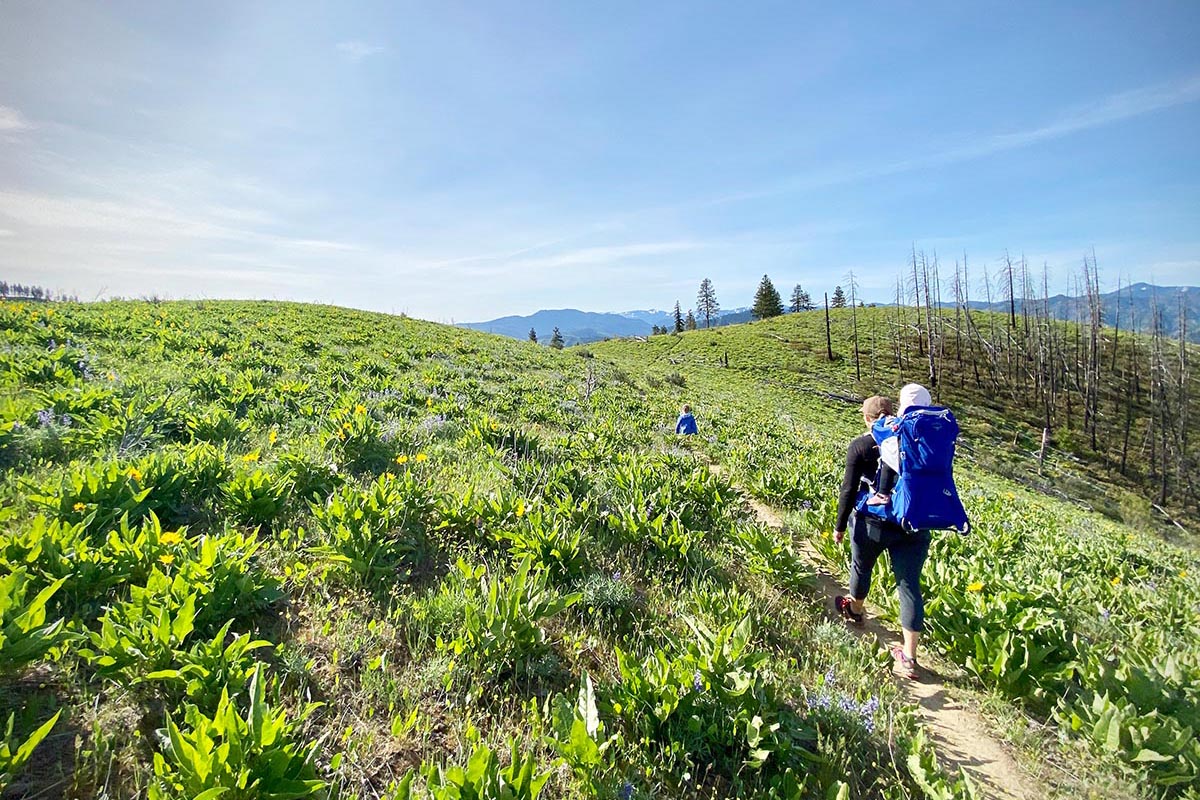
Osprey is a leader in the pack business, and their designs consistently deliver from a build quality perspective. The Poco Plus is case in point: the pack uses high-quality materials throughout, ranging from the robust 210-denier nylon along the pack body to the hipbelt padding and substantial buckles and straps. We’re only a season into testing, but everything is holding up exceptionally well. From our time with the prior-generation model, the only issue to be aware of is potentially tearing the mesh sides of the sunshade. Ours tore while sliding it out of its sleeve (the mesh caught somewhere inside its pocket), and this latest Osprey seems to have an identical design. But this is a fairly minor concern, and the pack feels well-built and hardwearing overall.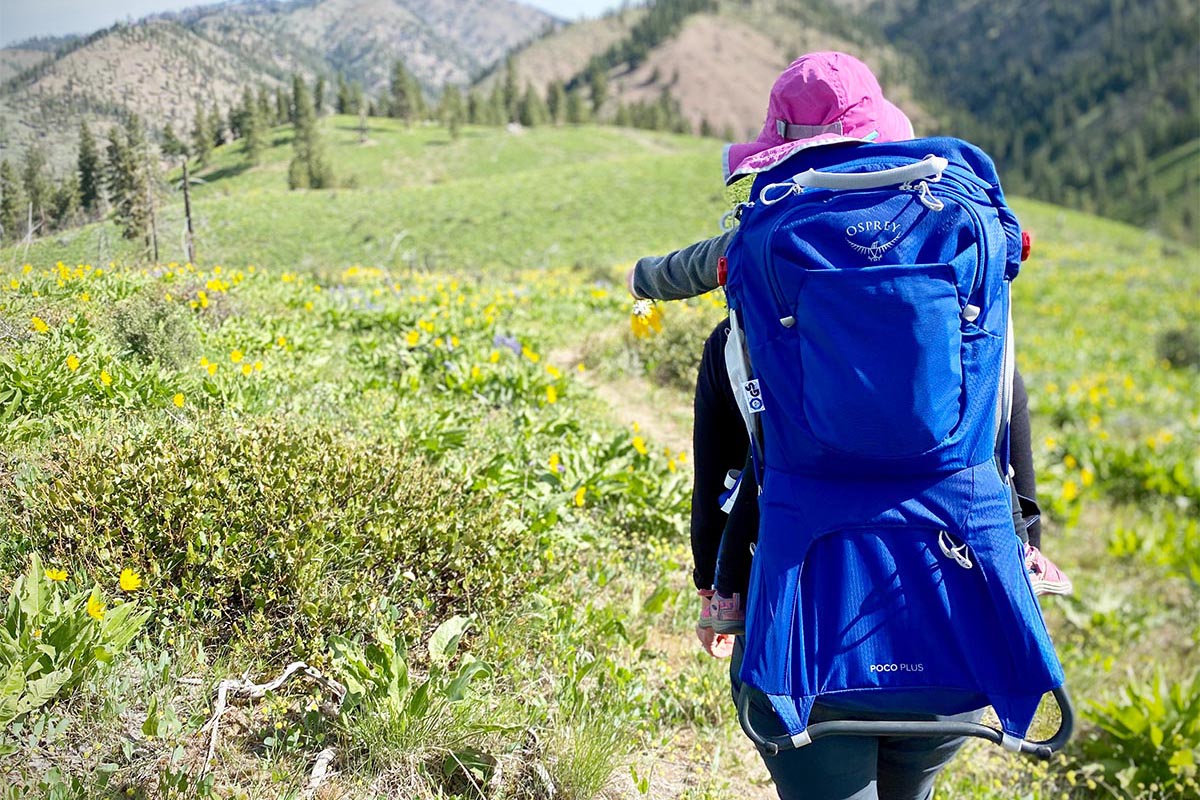
With multiple adults often sharing carrying duties, adjustability is a key component of child carrier packs. And like high-end competitors from Deuter and Thule, the unisex Osprey is extremely easy to modify. There’s a cutout in the mesh backpanel that allows you to flip open a handle and slide the shoulder straps up and down, and the hipbelt padding can be expanded/retracted for more or less coverage with its Velcro lining. My wife and I are pretty similar in height (5’7” and 5’9”) and torso length, but we still went through the resizing process each time we traded off because it was so easy and quick. We also both found the shoulder straps and hipbelt to be fairly accommodating, although the shape of the shoulder straps does favor my build over my wife’s. For those wanting a women’s-specific fit, Deuter offers the Kid Comfort Active SL, which fits smaller torsos and has narrower shoulder straps.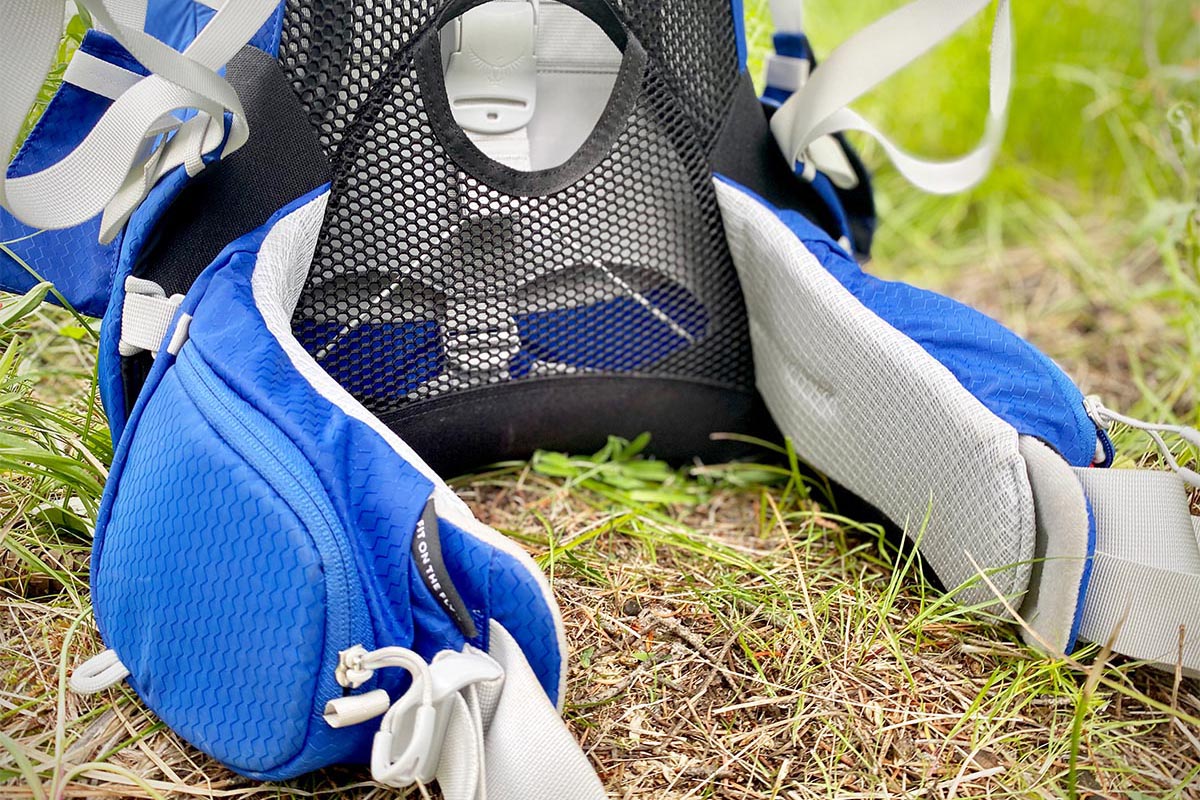
We put the Poco Plus to the test for this review, and Osprey also makes the pack in a standard Poco model. The Poco is more affordable at $290, but you do give up a few features. Namely, the standard version sports open mesh rather than zippered hipbelt pockets, has a smaller capacity at 20 liters, and offers less adjustability at the hipbelt with no “Fit-on-the-Fly” Velcro system. However, the rest of the design remains almost identical, including the built-in and highly protective sunshade, adjustable and removable stirrups, and even colorway options (black and blue). In the end, the Poco is a nice option if you’re looking to spend under $300, but we think it’s worth spending up for the Plus’ added features and capacity.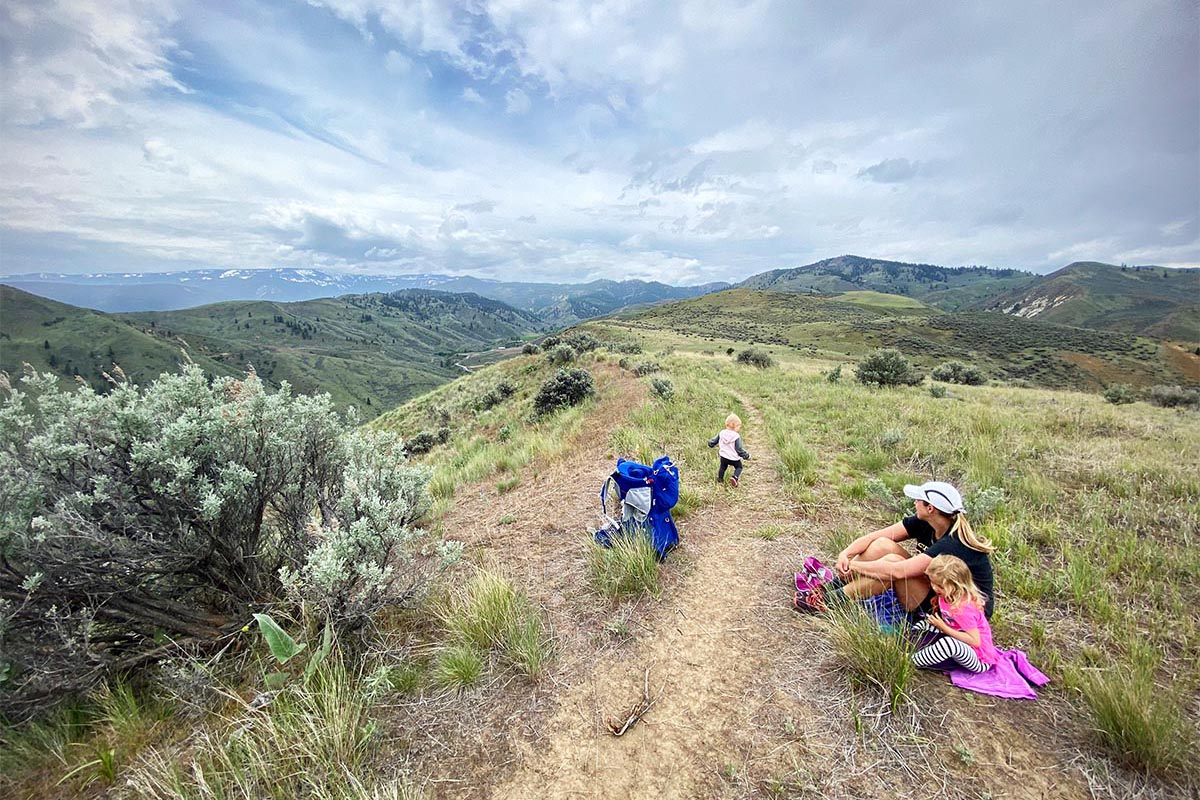
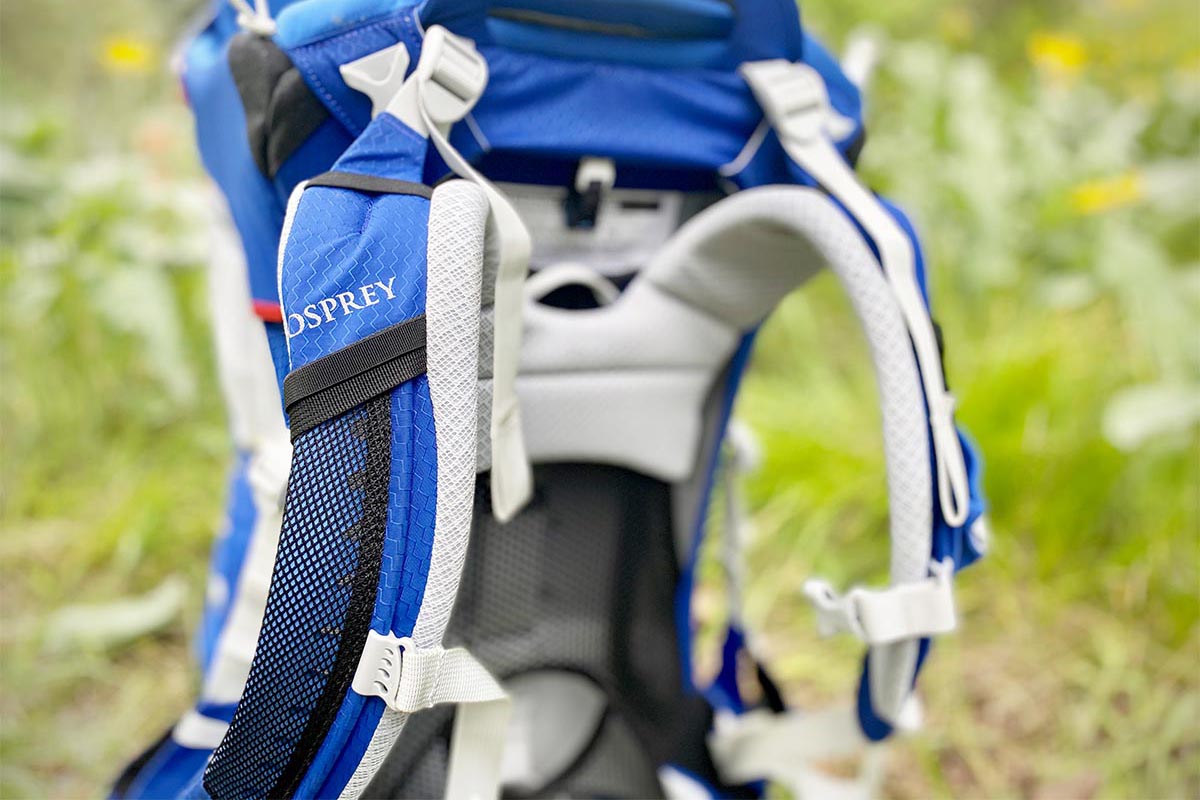
| Pack | Price | Category | Weight | Capacity | Sunshade | Max Weight |
|---|---|---|---|---|---|---|
| Osprey Poco Plus | $320 | Comfort | 7 lbs. 14 oz. | 26L | Yes | 48 lbs. 8 oz. |
| Deuter Kid Comfort | $300 | Comfort | 7 lbs. 2 oz. | 14L | Yes | 48 lbs. 8 oz. |
| Thule Sapling Elite | $350 | Comfort | 7 lbs. 15 oz. | 25L | Yes | 48 lbs. |
| Kelty Journey PerfectFIT | $300 | Comfort | 7 lbs. 4 oz. | 26L | Yes | 48 lbs. 8 oz. |
| Deuter Kid Comfort Active | $250 | Comfort/lightweight | 5 lbs. 14 oz. | 12L | No | 48 lbs. 8 oz. |
Osprey’s Poco Plus is a premium and well-built child carrier pack, but our favorite design this year is Deuter’s Kid Comfort. The Osprey gets the clear advantage in capacity at 26 liters versus 14 for the Deuter, but we’ve found the Kid Comfort still offers sufficient storage for nearly all day trips. In addition, the Osprey has an easier-to-use harness system: the two rear buckles secure faster than the three harder-to-reach buckles required with the Deuter. That said, the Deuter carries noticeably better, keeping the weight closer to your back and avoiding the complaints we had with the Osprey (including the rear grab handle hitting our neck). And at $30 less than the Osprey, we think the Deuter is the better overall value. Unless you need the additional carrying capacity, we think the Kid Comfort is the slightly better-built pack.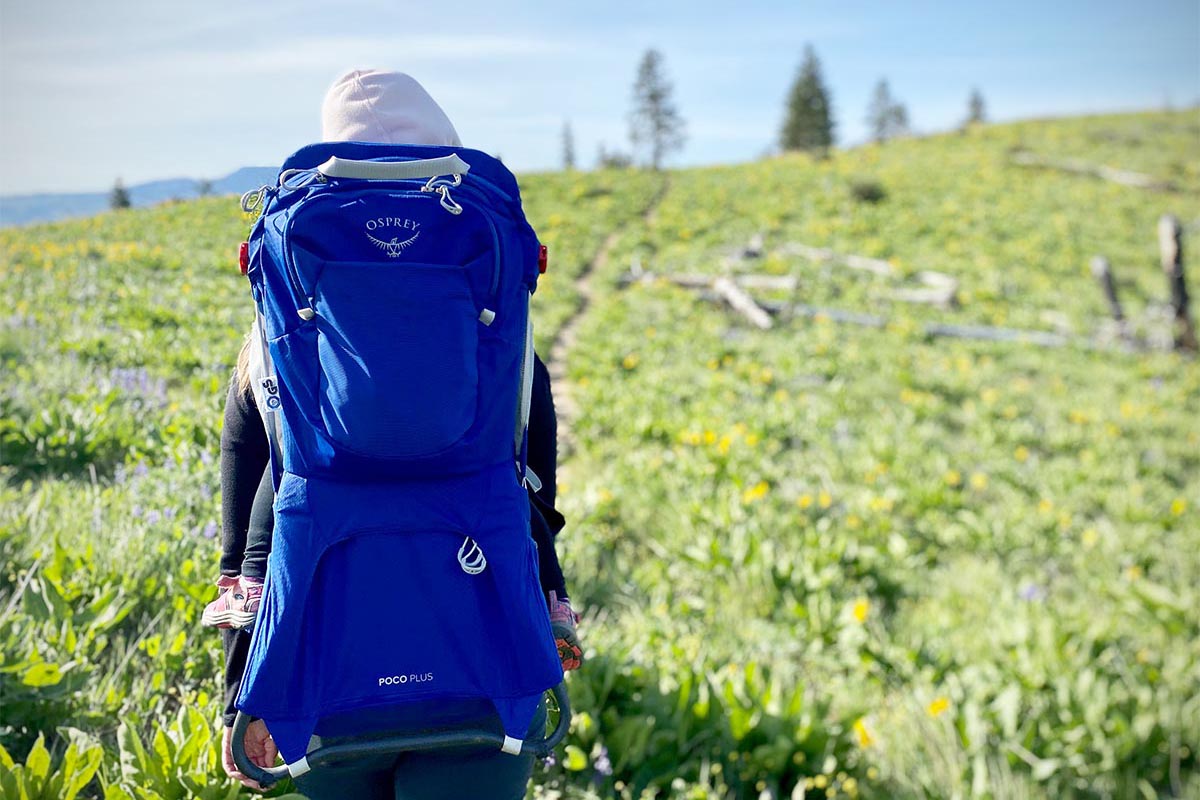
Thule’s Sapling Elite is another fully featured design to consider and one of the few packs that costs more than the Osprey at $350. The two child carriers share a lot in common, including the use of high-quality materials throughout, plenty of adjustability for both the torso and kid cockpit, and excellent storage (25L for the Thule vs. 26L for the Osprey). But the Thule gets a good portion of its storage from its removable daypack, which we’ve found to be less functional than integrated pockets. In addition, we had comfort-related issues with the Thule’s highly pronounced and stiff shoulder straps. Both are quality and well-made designs, but we prefer the more well-rounded and $20-cheaper Osprey.
Kelty’s Journey PerfectFIT Elite is their top-end model at $300 and stacks up competitively against the Osprey. Like the Poco Plus, the Kelty is a feature-rich design with 26 liters of storage, a highly adjustable torso length, an included sunshade, and hydration compatibility. But the Journey PerfectFIT can’t match the convenience of the Osprey’s child harness design, and its backpanel doesn’t ventilate as well. In addition, it comes up a little short of the Osprey in carrying comfort too, and this is a rare instance where a Kelty product isn’t a stellar value (although the $260 Signature variation offers decent bang for buck).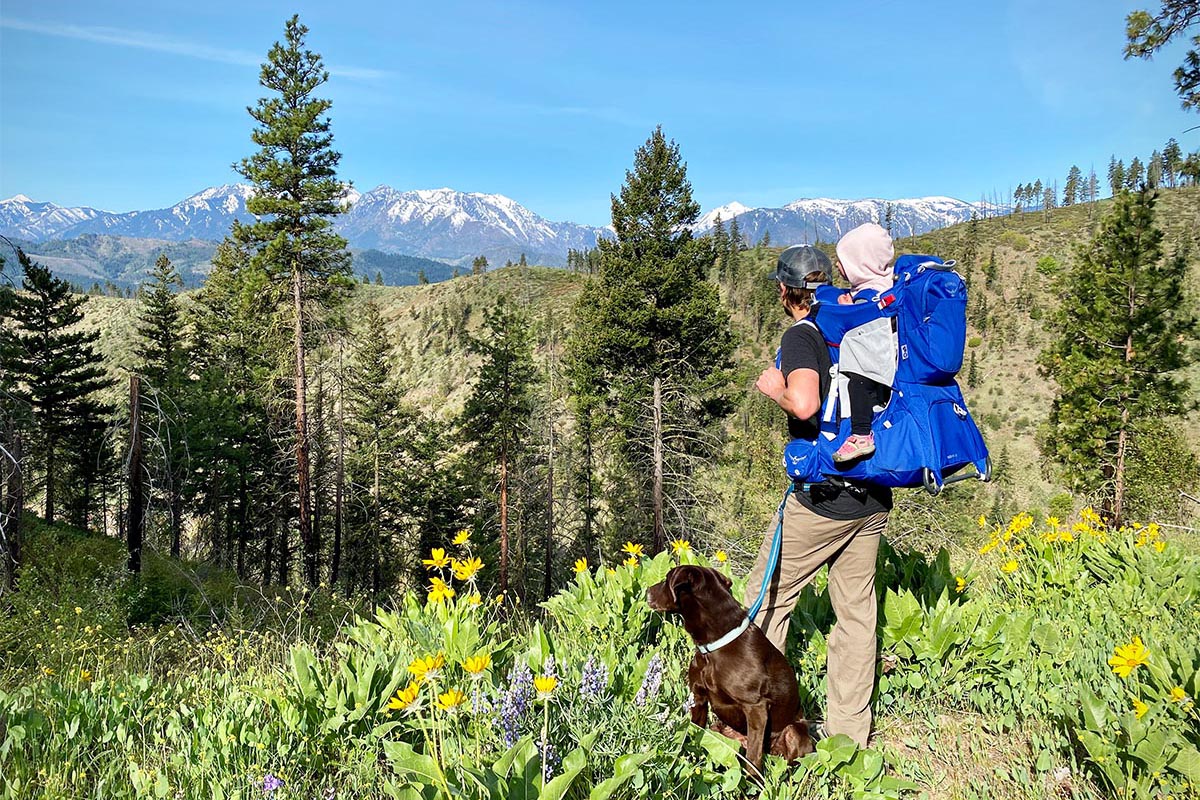
A final option to consider is Deuter’s highly ventilated Kid Comfort Active. This model is a simplified variation of the Kid Comfort above and includes nice touches for warm days, including extensive use of mesh along the backpanel and baby’s seat area. It’s also among the lightest heavy-hauling options at a full 2 pounds less than the Osprey. But you give up a fair amount for the weight savings, including an integrated sunshade (you can purchase one separately for $35), storage (12L vs. 26L), and cushioning (it uses far less than the Osprey). As we touched on above, one notable upside is that the Kid Comfort Active is available in a women’s-specific variation, but otherwise we think the Poco Plus is the more well-rounded choice.
If you’re thinking about buying gear that we’ve reviewed on Switchback Travel, you can help support us in the process. Just click on any of the seller links above, and if you make a purchase, we receive a small percentage of the transaction. The cost of the product is the same to you but this helps us continue to test and write about outdoor gear. Thanks and we appreciate your support!
Depending on the seller, most products ship free in the United States on orders of $50 or more. International shipping availability and rates vary by seller. The pricing information on this page is updated hourly but we are not responsible for inaccuracies.